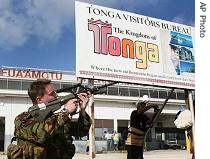-
(单词翻译:双击或拖选)
By Phil Mercer
Sydney
20 November 2006
 New Zealand soldiers patrol grounds of Fua'amotu Airport upon their arrival to Nuku'alofa, Tonga, Nov. 18, 2006 |
||
----
Tonga's international airport reopened Monday thanks to the presence of 150 New Zealand and Australian troops, deployed to secure key infrastructure2 following violent protests.
The Tonga government is also discussing with Australia and New Zealand additional military support after last week's riots in the capital, Nuku'alofa, which ended in the looting and burning of the main business district.
Social and political problems across the South Pacific have become permanent headaches for New Zealand and Australia, the region's two most powerful countries.
Along with the violence in Tonga, there have been threats of a military coup3 in Fiji and continued unrest in the Solomon Islands, parts of Papua New Guinea and East Timor.
New Zealand Prime Minister Helen Clark is worried that unstable4 Pacific countries could be exploited by criminals and extremists.
"Everyone is aware of what 'fragile and failed states' mean in today's world. It can mean penetration5 of financial systems, lax borders, drug trade, financing terrorism or other activities," she said.
International criminal gangs are reported to have laundered6 billions of dollars on the tiny island state of Nauru in the past decade and the United States has accused the island state of selling large numbers of fake passports.
Analysts7 blame the instability on poverty and corruption8. Lack of natural resources and the failure by government to improve social conditions fuel violence.
The Tonga riots erupted after pro-democracy groups accused the legislature of failing to move on expanding democracy in the kingdom.
The relative prosperity of some immigrants in impoverished9 South Pacific nations has also stirred resentment10.
Police in Tonga believe there was a strong anti-Chinese dimension to Thursday's disturbances11.
There were similar problems for the Chinese community in the Solomon Islands when trouble flared12 there earlier this year. Many Chinese shops were destroyed by rioters in the capital Honiara.
The Chinese government was planning Monday to airlift dozens of its citizens out of Tonga after looters and arsonists13 targeted their shops and businesses.
 收听单词发音
收听单词发音
1
deployed

|
|
| (尤指军事行动)使展开( deploy的过去式和过去分词 ); 施展; 部署; 有效地利用 | |
参考例句: |
|
|
|
2
infrastructure

|
|
| n.下部构造,下部组织,基础结构,基础设施 | |
参考例句: |
|
|
|
3
coup

|
|
| n.政变;突然而成功的行动 | |
参考例句: |
|
|
|
4
unstable

|
|
| adj.不稳定的,易变的 | |
参考例句: |
|
|
|
5
penetration

|
|
| n.穿透,穿人,渗透 | |
参考例句: |
|
|
|
6
laundered

|
|
| v.洗(衣服等),洗烫(衣服等)( launder的过去式和过去分词 );洗(黑钱)(把非法收入改头换面,变为貌似合法的收入) | |
参考例句: |
|
|
|
7
analysts

|
|
| 分析家,化验员( analyst的名词复数 ) | |
参考例句: |
|
|
|
8
corruption

|
|
| n.腐败,堕落,贪污 | |
参考例句: |
|
|
|
9
impoverished

|
|
| adj.穷困的,无力的,用尽了的v.使(某人)贫穷( impoverish的过去式和过去分词 );使(某物)贫瘠或恶化 | |
参考例句: |
|
|
|
10
resentment

|
|
| n.怨愤,忿恨 | |
参考例句: |
|
|
|
11
disturbances

|
|
| n.骚乱( disturbance的名词复数 );打扰;困扰;障碍 | |
参考例句: |
|
|
|
12
Flared

|
|
| adj. 端部张开的, 爆发的, 加宽的, 漏斗式的 动词flare的过去式和过去分词 | |
参考例句: |
|
|
|
13
arsonists

|
|
| n.纵火犯( arsonist的名词复数 ) | |
参考例句: |
|
|
|















